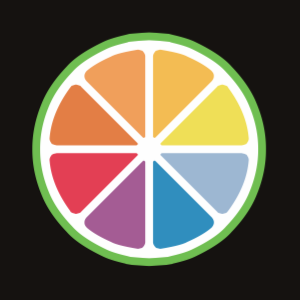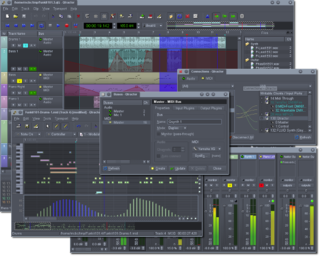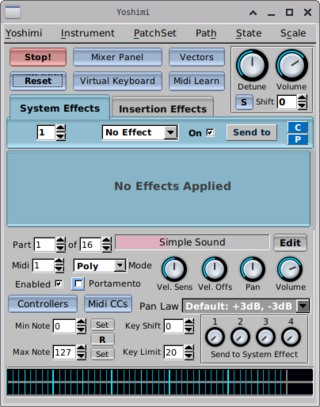Related Research Articles

A sound card is an internal expansion card that provides input and output of audio signals to and from a computer under the control of computer programs. The term sound card is also applied to external audio interfaces used for professional audio applications.

Advanced Linux Sound Architecture (ALSA) is a software framework and part of the Linux kernel that provides an application programming interface (API) for sound card device drivers.
The Open Sound System (OSS) is an interface for making and capturing sound in Unix and Unix-like operating systems. It is based on standard Unix devices system calls. The term also sometimes refers to the software in a Unix kernel that provides the OSS interface; it can be thought of as a device driver for sound controller hardware. The goal of OSS is to allow the writing of sound-based applications that are agnostic of the underlying sound hardware.
Ardour is a hard disk recorder and digital audio workstation application that runs on Linux, macOS, FreeBSD and Microsoft Windows. Its primary author is Paul Davis, who was also responsible for the JACK Audio Connection Kit. It is intended as a digital audio workstation suitable for professional use.
JACK Audio Connection Kit is a professional sound server API and pair of daemon implementations to provide real-time, low-latency connections for both audio and MIDI data between applications. JACK was developed by a community of open-source developers led by Paul Davis and has been a key piece of infrastructure and the de facto standard for professional audio software on Linux since its inception in 2002. The server is free software, licensed under GPL-2.0-or-later, while the library is licensed under LGPL-2.1-or-later.

Virtual Studio Technology (VST) is an audio plug-in software interface that integrates software synthesizers and effects units into digital audio workstations. VST and similar technologies use digital signal processing to simulate traditional recording studio hardware in software. Thousands of plugins exist, both commercial and freeware, and many audio applications support VST under license from its creator, Steinberg.

A digital audio workstation is an electronic device or application software used for recording, editing and producing audio files. DAWs come in a wide variety of configurations from a single software program on a laptop, to an integrated stand-alone unit, all the way to a highly complex configuration of numerous components controlled by a central computer. Regardless of configuration, modern DAWs have a central interface that allows the user to alter and mix multiple recordings and tracks into a final produced piece.
Rosegarden is a free software digital audio workstation program developed for Linux with ALSA, JACK and Qt4. It acts as an audio and MIDI sequencer, scorewriter, and musical composition and editing tool. It is intended to be a free alternative to such applications as Cubase.

MusE is computer software, a sequencer for Musical Instrument Digital Interface (MIDI) and audio, with recording and editing abilities. It was originally written by Werner Schweer and now is developed by the MusE development team. It is free software released under GPL-2.0-or-later.
LiVES (LiVES Editing System) is a free and open-source video editing software and VJ tool, released under the GNU General Public License version 3 or later. There are binary versions available for most popular Linux distributions (including Debian, Ubuntu, Fedora, Suse, Gentoo, Slackware, Arch Linux, Mandriva and Mageia). There are also ports for BSD, and it will run under Solaris and IRIX. It has been compiled under OS X Leopard, but not thoroughly tested on that platform. In early 2019, a version for Microsoft Windows was announced, with a release slated for in the second half of 2019.

Sound Blaster X-Fi is a lineup of sound cards in Creative Technology's Sound Blaster series.

alsamixer is a terminal user interface mixer program for the Advanced Linux Sound Architecture (ALSA) that is used to configure sound settings and adjust the volume. It uses ncurses to draw its user interface. It supports multiple sound cards with multiple devices.

Lyrion Music Server is a streaming audio server supported by the LMS community and formerly supported by Logitech, developed in particular to support their Squeezebox range of digital audio receivers.

Audacious is a free and open-source audio player software with a focus on low resource use, high audio quality, and support for a wide range of audio formats. It is designed primarily for use on POSIX-compatible Unix-like operating systems, with limited support for Microsoft Windows. Audacious was the default audio player in Ubuntu Studio in 2011–12, and was the default music player in Lubuntu until October 2018, when it was replaced with VLC.

PulseAudio is a network-capable sound server program distributed via the freedesktop.org project. It runs mainly on Linux, including Windows Subsystem for Linux on Microsoft Windows and Termux on Android; various BSD distributions such as FreeBSD, OpenBSD, and macOS; as well as Illumos distributions and the Solaris operating system. It serves as a middleware in between applications and hardware and handles raw PCM audio streams.

Mixxx is free and open-source software for DJing. It is cross-platform and supports most common music file formats. Mixxx can be controlled with MIDI and HID controllers and timecode vinyl records in addition to computer keyboards and mice.

Ubuntu Studio is a recognized flavor of the Ubuntu Linux distribution, which is geared to general multimedia production. The original version, based on Ubuntu 7.04, was released on 10 May 2007.

JUCE is an open-source cross-platform C++ application framework, used for the development of desktop and mobile applications. JUCE is used in particular for its GUI and plug-ins libraries. It is dual licensed under the GPLv3 and a commercial license.

Qtractor is a hard disk recorder and digital audio workstation application for Linux. Qtractor is written in C++ and is based on the Qt framework. Its author is Rui Nuno Capela, who is also responsible for the Qjackctl, Qsynth and Qsampler line of Linux audio software. Qtractor's intention was to provide digital audio workstation software simple enough for the average home user, and yet powerful enough for the professional user.

Yoshimi is an open-source software synthesizer for Linux. It contains three synthesis engines, using additive, subtractive and wavetable synthesis. Any single patch can use one or all. A kit mode allows a patch to have up to 16 of engine sets to support multi-layered sounds/drum kits. A complete setup or instance can contain anywhere from one to sixty-four patches.